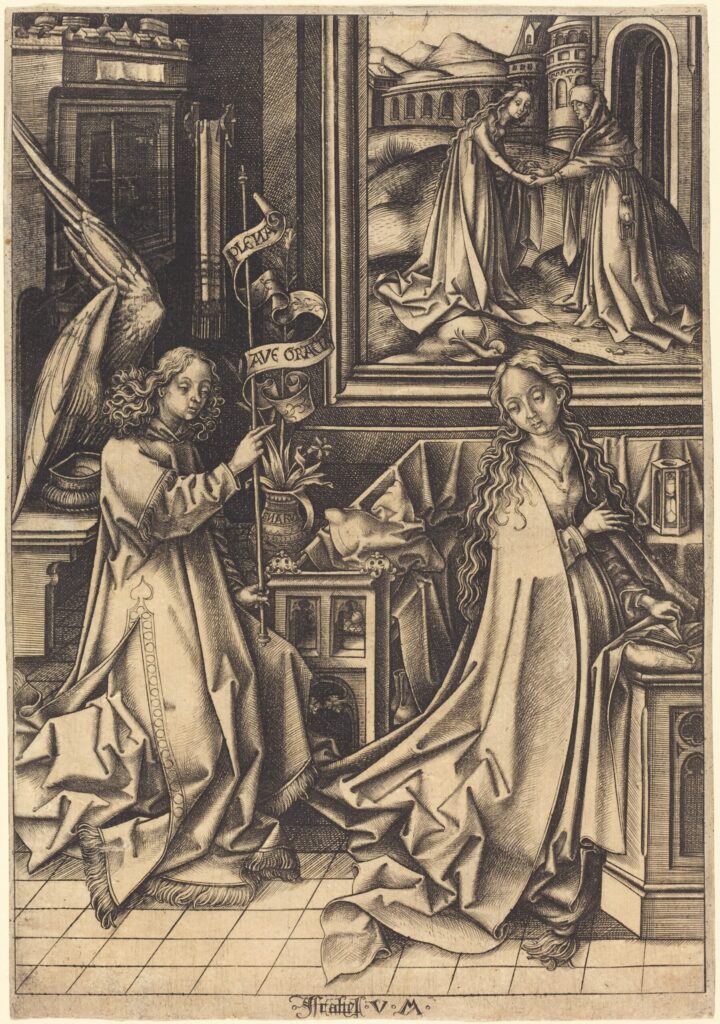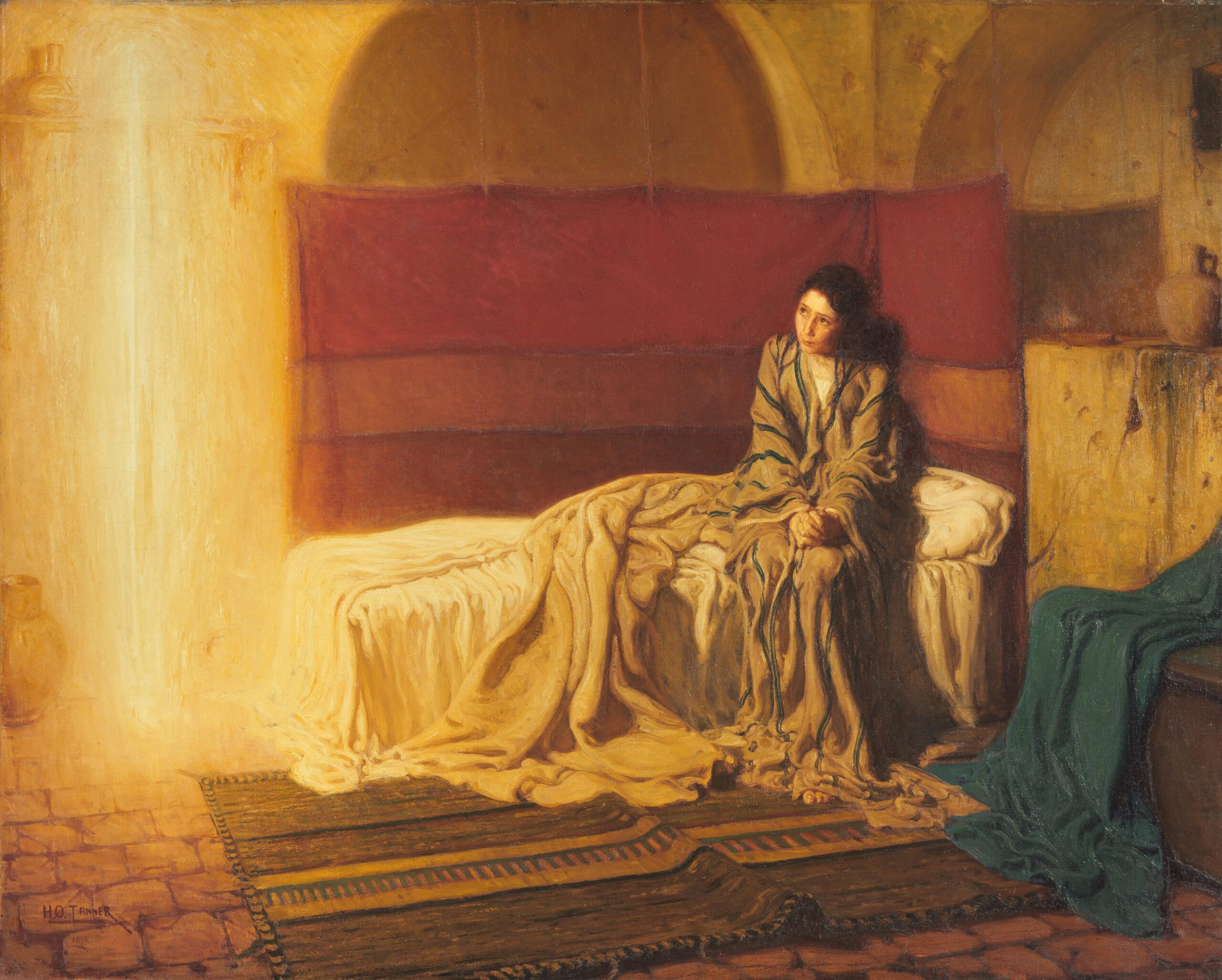When the world clings to its unshaped dreams, a current rises, subtle to the flesh and heavy with a sacred weight. At this trembling edge, an ancient intelligence abides; neither solar in its blaze nor confined to the patience of earth; but lunar, tidal, secret as the pulse beneath the night’s own skin. Gabriel they call him; the whisperer at the threshold; גבריאל, strong one of God, name veiled in water, sealed in silver, invoked by the tears of prophets, glimpsed in the gaze of poets. Thunder remains behind the curtain; fire dreams in silence. Gabriel, ancient in memory, stands within corridors where symbol and flesh entwine. The sign of his crossing appears as wound and balm, as mirror and key, a sigil living and breathing at the very crossroads of worlds.
To speak of Gabriel is to descend through labyrinths spun of reflection. No terminal, only thresholds within thresholds, mirrors peering into mirrors, passage through veils layered one upon another. His domain stretches far beyond mere annunciation; he weaves himself within the currents of Yesod, the ninth sephirah, a sphere unfixed by crown, unhoused by banishment. Yesod gathers all tributaries of Divine influence, distilling them for the world below. The Tree of Life maps him as the living bridge: Malkhut in exile lies beneath, while the supernal architectures gaze downward. Nevertheless, Gabriel exceeds the diagrams; he is passage itself, the keeper of the lunar gate, the one who carries the Word through the world without ever binding it to his name. Ether in the lungs of dreamers, dew upon the brow of those who keep vigil at the world’s end, echo of waters that remember the silence before all things; this is his realm.
Gabriel dwells where language collapses. He is less a message than the longing for annunciation; the lunar force is his blood. The silver current his diadem.
I. The Silver Foundation: Yesod and the Lunar Priesthood
To approach Gabriel is to enter Yesod, a foundation of no common stone, an altar invisible and quickening. Lunar tides sweep through caverns of consciousness; images lift themselves from shadow, clothed in vapours of dream. Yesod, the hidden treasury, draws every emanation from higher spheres into distilled essence. There lies a basin, a pool, a vessel: receptive yet forever pouring, filled without containment, yielding without loss.
Within the lexicon of the mystics, Yesod fashions itself as generative abyss. Gabriel presides, not as sentinel armed with sword and flame, but as midwife, conductor of mysteries, a presence as near as breath and yet receding ever behind a gossamer veil. Lunar is his office: receiving, reflecting, veiling. Revelation does not arrive in daylight’s blaze; rather, twilight’s susurrus opens the gate. Every vision and prophecy which pierces the husk of habit must pass through Yesod, through Gabriel’s hands. All secrets of heaven enters earth by way of his silent liturgy.
Yesod, navel of the world, umbilicus joining soul and cosmos. In this unfathomable hollow, Gabriel braids silent hymns. He sets forth no edict. Prophets’ dreams and exiles’ longing flow through his silver fingers. Power here in the rising of the lunar tide; reflection blooms into revelation, as mirror becomes passage. The veil, so often mistaken for an obstruction, proves itself to be the very path.
II. Angels of the Liminal: Guardians of Eden, Pillars of the Temple
The architecture of Sacred story begins with exclusion. The expulsion from Eden places Adam and Eve before a barred threshold, sword of fire turning in the east, cherubic presences posted as keepers of mystery. Later tradition appoints Gabriel and Raphael to this watch, sentinels at the gate, their presence both wound and promise. They wait not to forbid, but to call forth the time of return.
The Temple of Solomon echoes Eden with its own threshold: Jachin and Boaz, twin pillars of bronze, rise as living signs at the entrance to the holy. Each anchors an axis: Jachin, “He establishes”; Boaz, “In Him is strength.” These are more than columns of stone. Each one is a prayer in bronze, a memory of the axis mundi, a vertical bridge where heaven and earth entwine. Among the guardians of this passage, Gabriel lingers as a silent sentinel, spirit of the lunar gate. His watch inclines toward Boaz, pillar of strength veiled in shadow and water, the side of the moon’s own keeping. To cross between these sentinels is to pass through his province, guided by a presence that never compels, only invites the soul to traverse from exile into sanctuary.

Within this hush where the Word stirs in dream, Gabriel arrives by lunar silence, presence woven among tapestries and vessels. The message hovers between realms – Ave, gratia plena – a breath suspended at the threshold. The angel shimmers as veil and presence, the Virgin receives as mirror rather than vessel. Behind them, a distant encounter weaves the hidden circuit of transmission, threshold layered upon threshold, water poised on the edge of flesh. The entire scene sings of Yesod: the hour when light seeks a body and mystery bends its gaze toward earth.
Within the Tree of Life, these pillars find their shadow in Chesed and Gevurah, mercy and severity, columns flanking the middle path. But all rivers run toward Yesod. There Gabriel gathers their waters, receives what the pillars pour, and shapes the descent into Malkhut. Gate and key dissolve into movement; Gabriel the subtle current, the passage itself. Eden remains veiled, although always near. The Sacred stands ready behind the pillars, awaiting the touch of an unseen hand.
Rites both ancient and emergent summon Gabriel as archetype of the messenger; conductor of souls, master of crossings, lord of liminal hours. He guides births and deaths, dreams and awakenings, exiles and homecomings. Thresholds crackle with his presence; every initiation by water, every vigil at the edge, pulses with his shadow. Gabriel is the heart of the temple’s silence; the priest behind the curtain, the cantor who sings through mirrors, the witness as worlds fracture and mend.
III. The Mirror and the Word: Gabriel, Annunciation, and the Return of Shekhinah
The office of messenger crowns Gabriel in every tradition rooted in the Book. He comes in the hour of impossible conception, carrying not the law, but a trembling word: a seed, a shadow, a note played in the body of the world. He announces the coming of the Logos to Mary; to Zacharias the birth of the prophet; to Muhammad the descent of the Recitation. He perennially brings forth an utterance to be received, a vision to be incubated, a spark to be veiled within silence.
The wonder of Gabriel emerges in reception. He steps in when the world exiles itself, when Shekhinah drifts in hiddenness, when the seen and the unseen drift apart. His art is Tikkun Olam – the sacred restoration, the gathering of lost sparks. To welcome Gabriel means to become vessel for reunion; to let Malkhut and Tiferet converge, to host the hidden marriage of Shekhinah and Logos, fragment and form. The journey unfolds in silence, in image, in the gentle swelling of the lunar current. Gabriel sanctifies the veil, teaches that only through reflection can passage arise.
Gestures of symbolic writing, trues rites, oracular movements mimic the ministry of Gabriel. He is summoned in the silence before the Word, in the tremor before the symbol is born, in the gaze that glimpses unity beneath the world’s fracture. To serve Gabriel is to become liminal: mirror, threshold, vessel of annunciation, dweller between exile and return. It means serving passage, honouring the way, worshipping the veil as both mystery and sign.
Coda: For גבריאל – Gabriel
In Yesod’s house, beneath a silver wing, a scribe kneels and the world hushes its breath. Waters shimmer, and ancient speech moves unbroken. Trumpets sleep. Only the long, lunar chant, tides circling heart and night, arises here.
Gabriel, גבריאל, tending flame behind the mirror, bearer of wounds and silent annunciations – receive this gesture, marked by remembrance.
Let those who approach your gate taste wisdom’s night.
Let the silver foundation hold souls steady, balancing absence and form, longing and arrival.
Exiles, come drink dew of return.
Let every word settle with weight, every mirror open as a door.
Beneath the sign of the archangel whose wings shelter every crossing, this offering is placed between word and hush, in the veiled house of the lunar temple, for all who serve the liminal, for the exiled and the returning.
גבריא
So be it.
Fiat Lux.
